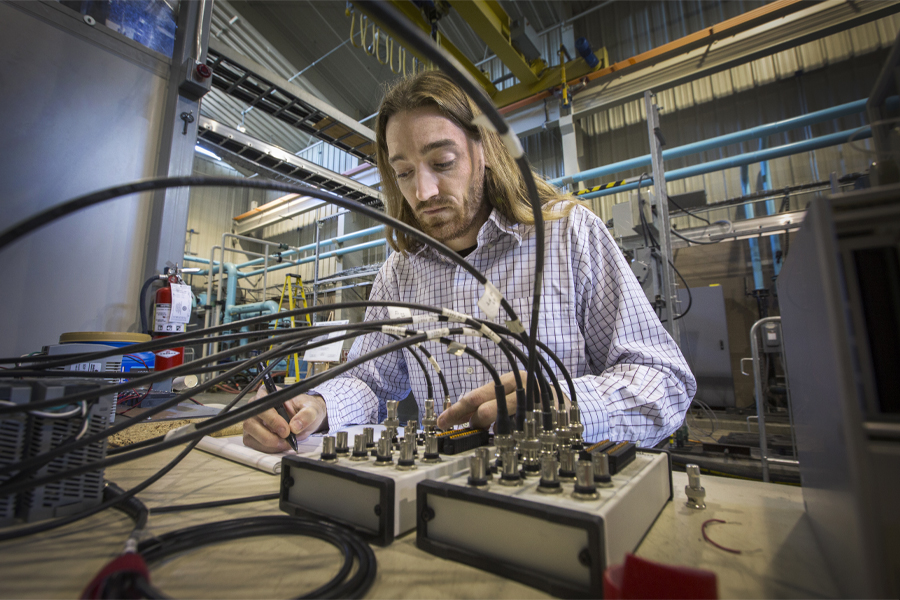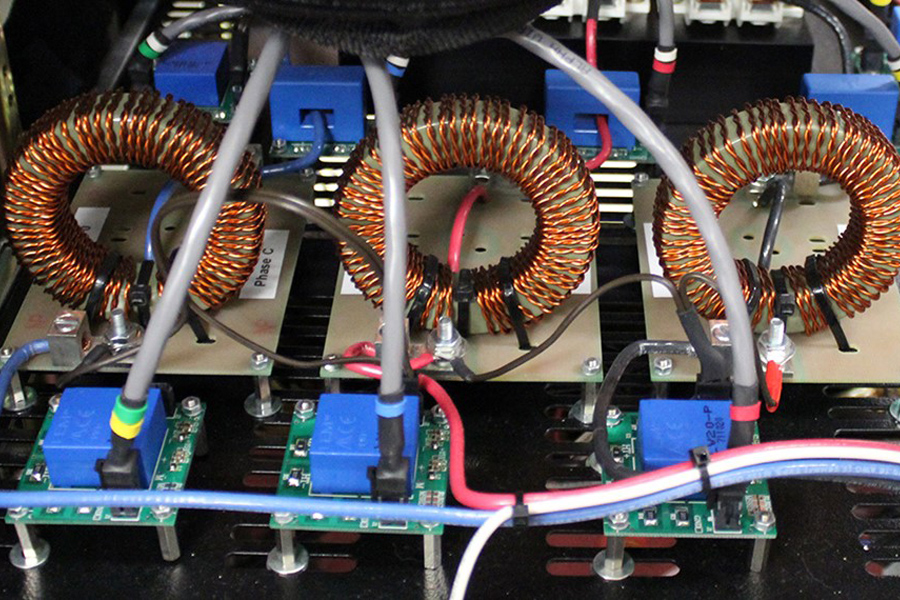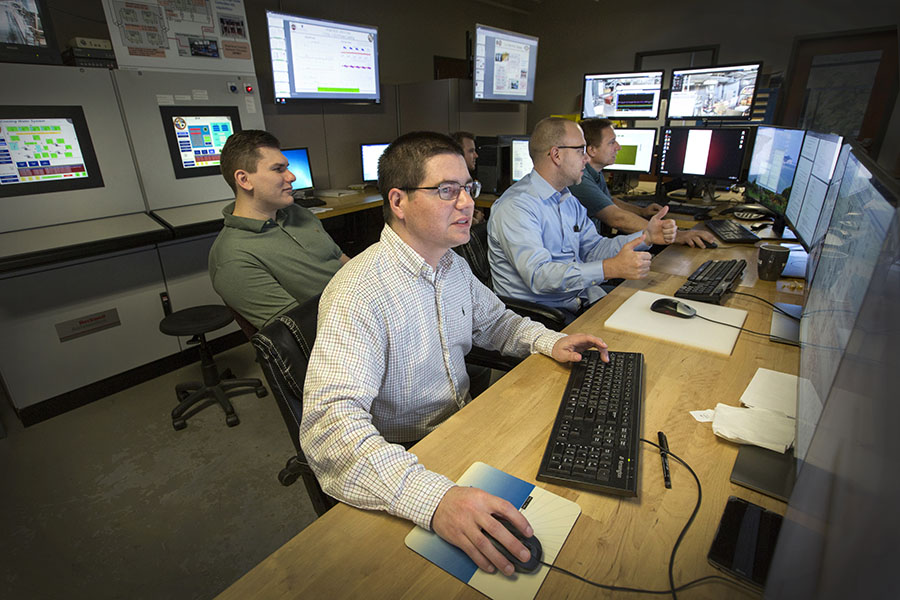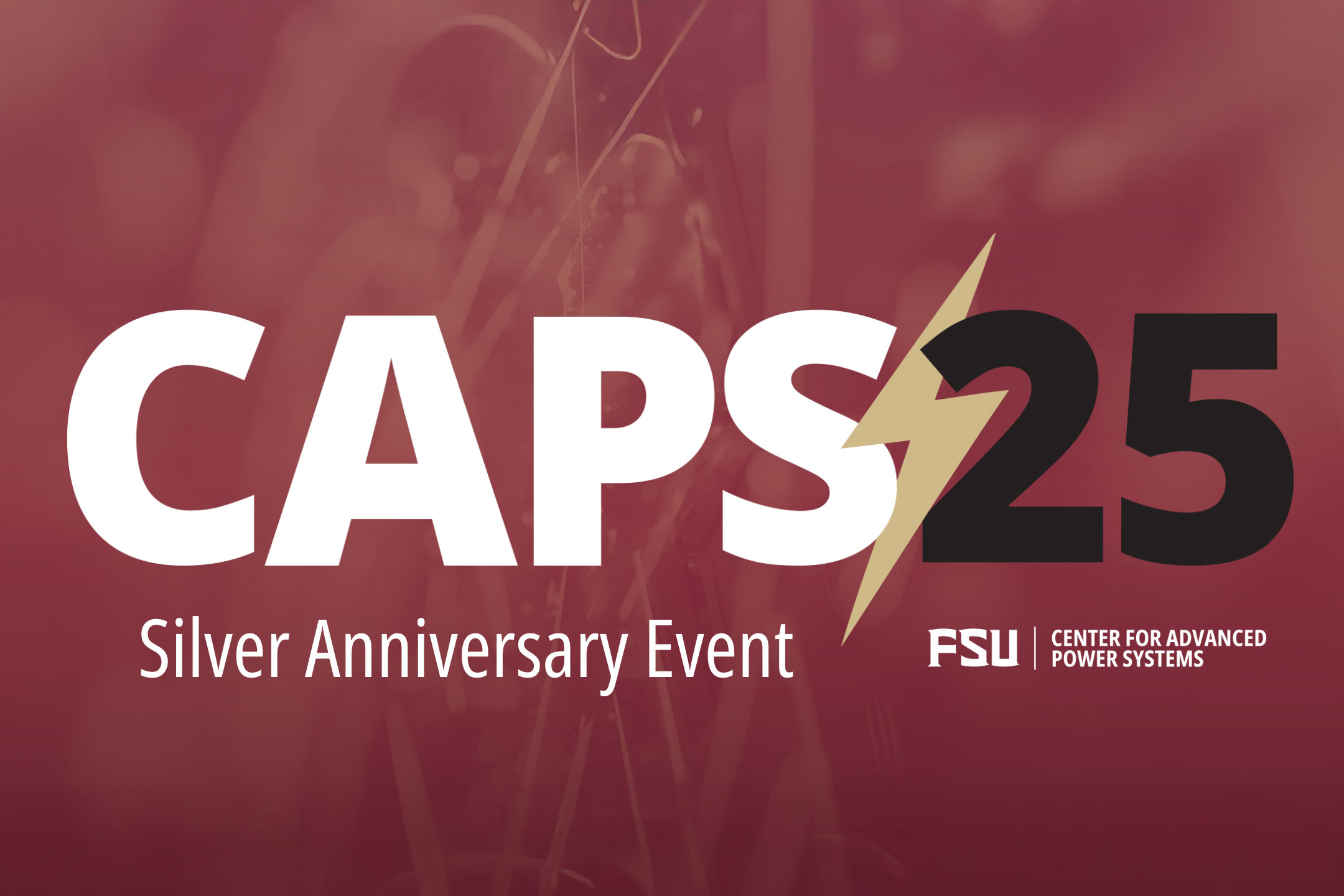
The modern world runs on power systems — networks moving and using electricity to fulfill all manner of tasks.
For 25 years, Florida State University’s Center for Advanced Power Systems (CAPS) has been at the forefront of innovation and training to advance the technologies that allow these complex power systems to perform at their best.
“At CAPS, we’re committed to taking on big, difficult problems,” said Roger McGinnis, center director. “The research and development taking place here are not only pushing the boundaries of what’s possible in energy solutions but also playing a critical role in helping Florida and the nation meet both current and future energy demands.”
The center is celebrating its 25th anniversary this month and recognizing the many people who helped establish CAPS and have transformed it into one of the country’s premier research centers for electric power systems modeling and simulation, power electronics and machines, control systems, cybersecurity for power systems, superconducting power devices and more.
Innovators at CAPS include both full-time research faculty at the center and shared tenure-line faculty with the FAMU-FSU College of Engineering. Together, they have built a hub for power systems engineering that attracts investment from the U.S. military, the Department of Energy, NASA, and private companies to lend their expertise in solving difficult problems.
“The Center for Advanced Power Systems stands at the forefront of innovation, where cutting-edge research and collaboration shape the future of energy and build new technologies,” said FSU Vice President for Research Stacey S. Patterson. “The research that happens here is helping to power the world.”
BORN IN SERVICE
Since its founding in 2000, CAPS has worked closely with the U.S. Navy.
The center’s first grant came from the Office of Naval Research. At the time, the center existed only on paper and researchers worked out of the National High Magnetic Field Laboratory, or MagLab. By 2003, the center had a new home — a purpose-built facility in Innovation Park, close to the MagLab and the FAMU-FSU College of Engineering. It was an ideal hub for bringing together researchers to support the Navy’s need for advanced technology and to tackle other thorny problems in power engineering.
“We have really planted our flag in this field,” McGinnis said. “Our ongoing partnership with the Navy shows that CAPS researchers can be relied upon to deliver the technology that our military needs to remain effective. That mission is personally meaningful to me and is critical for the strength and success of our country.”
McGinnis began his career in the Navy. He has been part of meeting the technological needs of the Navy through his time in the service, and he continues that mission as the center’s director. He served in key positions in the Office of Naval Sea Systems Command, the Office of Naval Research (ONR) and the Department of Homeland Security before retiring with the rank of captain. He’s also an alumnus of the Naval Postgraduate School in Monterrey with a doctorate in physics.
CAPS has continued to work closely with the Navy throughout its history. The center is at the forefront of efforts to improve power systems on ships and plays a leading role in the Electric Ship Research and Development Consortium, a group of eight universities developing a ship that uses electric power for propulsion, pulsed power weapons, sensors and all other needs. In 2021, the center received a $31 million contract from the Naval Sea Systems Command for the research and development associated with shipboard electrical power and energy systems.
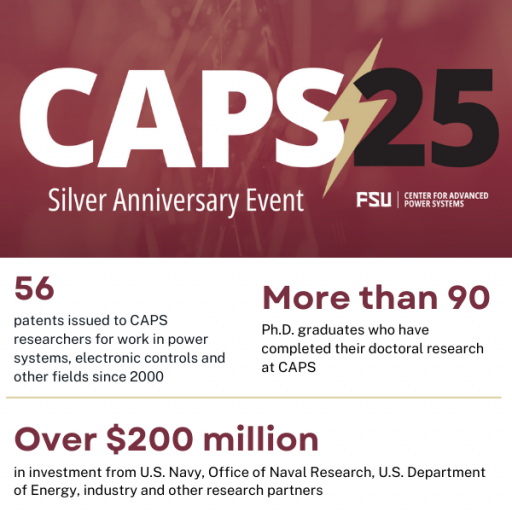
SIMULATION AND SUCCESS
A major component of CAPS research and development activity is power hardware-in-the-loop (PHIL) simulation, a way to test electric power hardware in a simulated circuit at realistic high voltages and currents. Testing in PHIL environment allows engineers to see how new equipment operates in the system, without the cost and risk of actually operating in a real system. This capability helps in fast prototyping of new electrical power system technologies.
In 2002, the center acquired its first four Real Time Digital Simulator racks. More improvements soon followed. In 2004, CAPS dedicated a new 5-megawatt voltage test facility. This facility allowed researchers to model complex, high-voltage systems such as electric ships or the control systems at a national laboratory.
CAPS leadership has continued to upgrade the center’s real-time simulation capabilities throughout the institution’s history. In 2008, CAPS earned a Defense University Research Instrumentation Program grant to upgrade the simulator’s dynamometer, extending its speed to 24,000 rotations per minute at 5 megawatts, which allowed researchers to test high speed generators. Other upgrades — faster processors, state-of-the-art power electronic converters and more — have followed, helping to make the center a leader in hardware simulation.
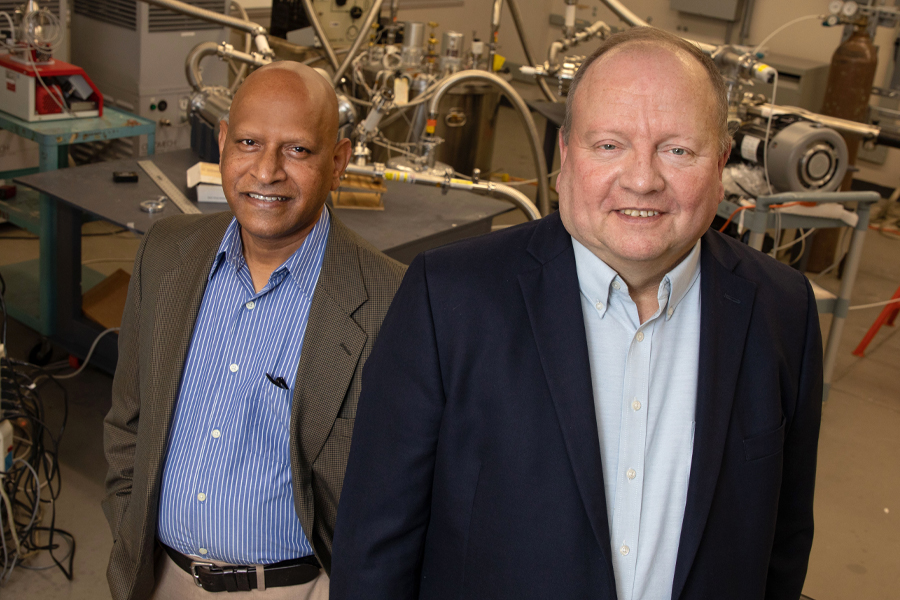
ENERGY EVERYWHERE
Although work with the Navy remains a focus at the center, the military is not the only entity coming to CAPS to help develop new technologies.
The center has expanded its research portfolio to meet challenges in other arenas, such as power grid, electric transportation, power electronics, autonomous systems, cyber-physical systems security, superconducting power devices, cryogenic technology, power grid security and data centers power needs.
Researchers also work closely with industry partners to bring together their complementary expertise on projects. CAPS has worked with large companies such as Mitsubishi Heavy Industries, General Electric, General Dynamics, General Atomics, Curtiss-Wright, Eaton, ABB, TECO-Westinghouse, Meta and Google. Researchers at the center also have established relationships with small businesses such as Hepburn & Sons, IREUS Technologies and others through initiatives such as Small Business Innovation Research and Small Business Technology Transfer programs.
Businesses often have great ideas but lack the facilities or specialized knowledge to develop or test prototypes. CAPS researchers have frequently helped fill that gap.
Today, research at CAPS spans a wide array of projects, helping to improve power systems’ resilience and reliability. Examples include:
- A jointly funded project with the U.S. Department of Energy that will help keep energy transmission systems functioning in the wake of cyberattacks.
- Research to develop new safety mechanisms for short-circuit or open-circuit faults.
- A partnership with a private company to demonstrate the first high-temperature superconducting direct current power transmission cable.
Researchers continue to stake out new avenues for expansion. Last year, CAPS signed an agreement with the Future Energy Exports Cooperative Research Centre (FEnEx CRC), an Australian organization established to future-proof energy exports through industrial-scale research and innovation. Through the partnership, CAPS researchers hope to make breakthroughs in hydrogen-related research.
The center is also partnering with Oak Ridge National Laboratory and Carnegie Mellon University to improve security and resilience of complex cyber-physical systems. These engineered systems integrate computational components like sensors, software, and networks with physical processes. Examples include smart electric grids, autonomous vehicles and more.
PREPARING FOR THE FUTURE
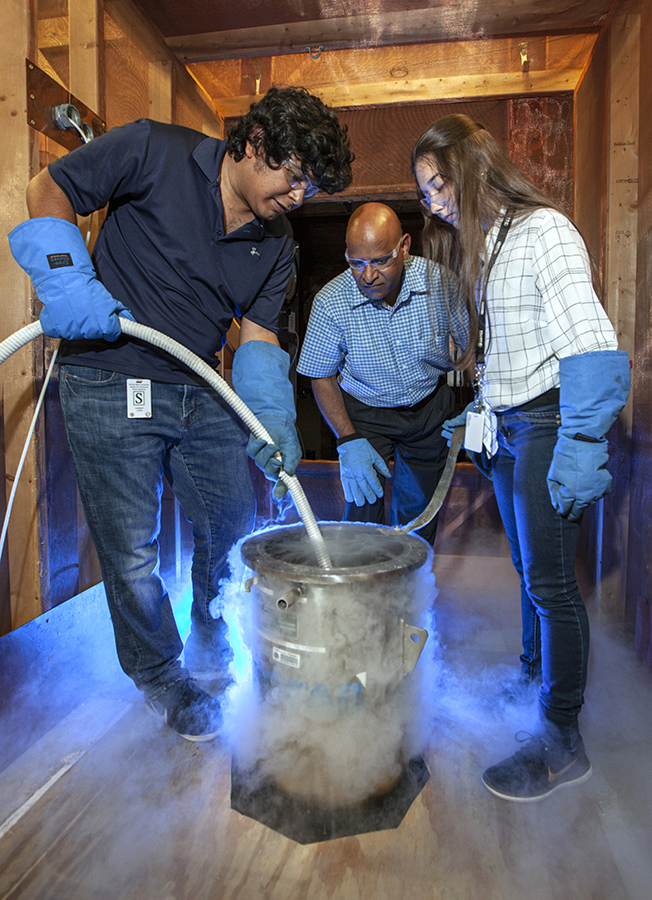
CAPS began with a multifaceted mission — serving the needs of its sponsors, generating new knowledge in both basic and applied research, and training the next generation of power engineers to provide the workforce of the future.
The generations of center alumni working in academia and industry are a testament to the success of that final point. More than 90 researchers have earned doctorates in electrical and mechanical engineering while working at CAPS, and numerous masters and undergraduate students have contributed to research and transitioned to graduate programs or professional engineering careers.
“Teaching and workforce development have always been hugely important at CAPS,” said Associate Director Sastry Pamidi. “The students who work here today, at all levels, from undergraduate to doctoral candidate, are part of a thriving research ecosystem. They are developing skills that will pay off in their careers and for society for years to come.”
To learn more about the Center for Advanced Power Systems (CAPS), visit caps.fsu.edu.




